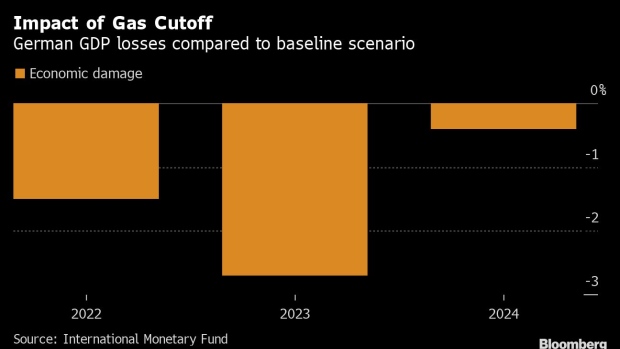Jul 20, 2022
Almost 5% of German Economy at Risk Over Russian Gas, IMF Warns
, Bloomberg News

(Bloomberg) -- Germany is at risk of losing 4.8% of economic output if Russia shuts down supplies of natural gas to the country, the International Monetary Fund warned.
Most of the impact would materialize next year, caused by production cuts and damage to economic confidence, researchers at the Washington-based institution said in a report. Inflation could be fanned by about 2 percentage points on average in 2022 and 2023, it said.
“The shutoff of Russian gas would have sizable effects on German economic activity,” researchers Ting Lan, Galen Sher and Jing Zhou said. “These economic losses would be permanent in the sense that they are not ‘caught up’ by deferring production, consumption, or investment to subsequent years.”
The report was released after the IMF’s so-called Article IV consultation on Europe’s largest economy, which singled out cuts to Russian energy shipments as the “greatest threat” facing Germany. President Vladimir Putin signaled this week that Europe will start getting gas again through a key pipeline, but warned that unless a spat over sanctioned parts is resolved, flows will be tightly curbed.
While German officials have taken important steps to mitigate the damage, more can be done to promote greater energy efficiency, the IMF said. Lower consumption by households, for example by reducing heating temperatures during the winter period, would also help significantly in limiting the impact, they said.
In light of these risks, IMF officials suggested after their consultation that the German government should remain flexible on fiscal policy and consider activating the exemption from its constitutional spending limits for another year if downside risks materialize.
Finance Minister Christian Lindner has frequently argued that Germany and its peers in the euro zone should scale back public spending to avoid fueling inflation that’s currently running at more than four times the European Central Bank’s 2% target. Officials familiar with the matter have said that the country will ditch its plan to return to strict borrowing limits next year if Russia stops gas deliveries.
Germany is meanwhile ramping up spending through special funds to accelerate the energy transition and beef up its military. The use of such financing vehicles should be minimized to protect the credibility of the country’s fiscal framework, the IMF said.
©2022 Bloomberg L.P.





